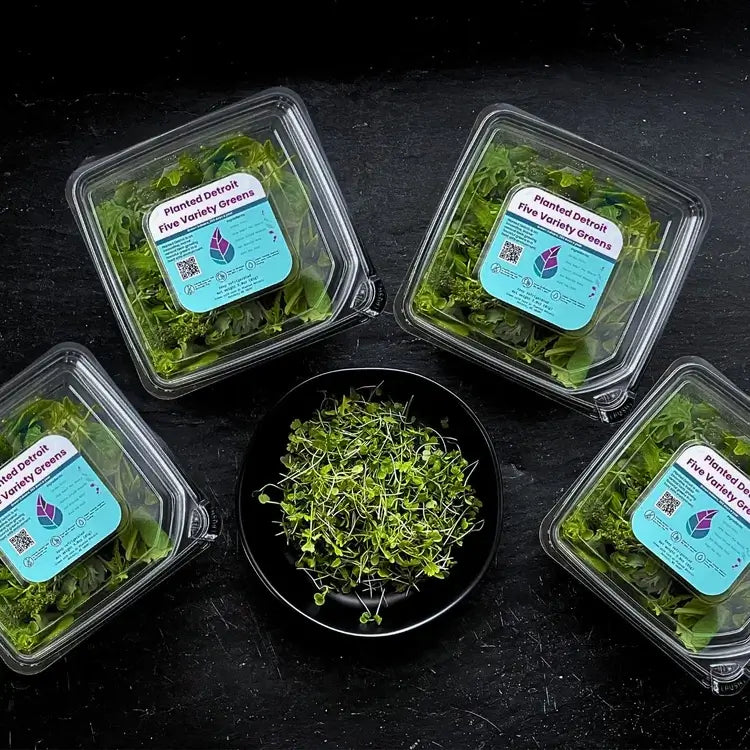
Isn’t it true that we sometimes under-appreciate the modest beginnings of our food? We usually don't stop to think about the complex relationship between the crops we eat and the sophisticated network of infrastructures that underpin their route from farm to table. Today, let's set off on an expedition to investigate the vital part of commodity crops in our food system and their effects on the food we consume, our farming techniques, and the environment itself. As we tread along, we will also explore how Planted Detroit, Michigan's largest vertical farm, provides a sustainable and creative solution to conventional farming. Let’s dive in, shall we?

So, what are commodity crops? These crops are traded worldwide, and are major agricultural goods whose production and distribution are indispensable for the working of our food system. Consider basics such as corn, wheat, soybeans, and rice; these make up for a huge web of food companies. These foods not only constitute our food supply, but they are also the very foundations on which our food system rests.
The ubiquity of commodity crops affects every part of the food sector. These plants make up the basis of a complex system of production, distribution, and consumption from the processed foods spread over grocery aisles to the animal feed for our livestock. In economic terms, these plants are geopolitical tools propelling global trade dynamics; they are more than just agricultural goods. Government subsidies finely adjust production patterns, therefore developing sophisticated economic systems in which agricultural output becomes a strategic economic lever rather than just sustenance.
The Other Side of Mono-Cropping
One of the means to address large-scale degradation of the environment, when it comes to raising one single type of crop, is monocropping. Some of its challenges include:
-
Soils running down at a huge rate of nutrient
-
Use of more toxic chemicals per unit area
-
Lessened diversity
-
Depletion of ecosystem resilience
Vertical farming models offer newer and more innovative ways to take care of the environment by setting up a controlled agricultural unit, thus drastically reducing and zeroing in on the pressures on nature.
Pioneering new possibilities: harnessing agricultural advancements

These models negate the modernistic food production hierarchies along with utilizing sophisticated tools such as hydroponics. Urban & vertical farming serve as great industrial farming paradigms. Planted Detroit is an exceptional example of this change. Our platform is the biggest vertical farm in Michigan and demonstrates how targeted, locally relevant agricultural development can mitigate environmental sustainability, eating diversity, and community resilience.
Consumer Empowerment: Propelling Agricultural Change
Supporting sustainable farming techniques, emphasizing on locally grown food, and making deliberate food decisions will together contribute to systematic agricultural innovation.
Encouraging local farms such as ours provides consumers a real way to be part of this agricultural rebirth. Every acquisition is a vote in support of a more sustainable, robust food system.
Nutritional Landscape: Beyond Caloric Sustenance
The omnipresence of commodity crops in processed food production engenders significant nutritional considerations. Dependent mostly on a small number of crops, our present food system often sacrifices nutritional complexity and dietary variety.
The spread of corn and soybean products across processed food categories evidences this nutritional uniformization. Even more limiting in terms of dietary diversity, such agricultural monocultures might help to fuel more general issues of public health.
Check out our vibrant menu !
Choosing Locally Grown Produce
Worth noting here is the great power consumers have in restructuring food systems via their buying power. Selecting locally grown foodstuffs not only supports the local farmers but also greatly lowers food miles, therefore reducing greenhouse gas emissions. Planted Detroit's farm-to-table line offers people a concrete means of helping in this project, hence reflecting and supporting the values of community engagement and sustainability.

Why Planted Detroit Is Part of the Solution
What's the solution then? Planted Detroit is a part of it !
At the forefront of a sustainable food revolution, Planted Detroit integrates innovation with a deep commitment to environmental stewardship and community well-being. As well as showing the possibilities of regional food systems, the vertical farm model tackles the problems presented by commodity crops. Planted Detroit shows a way ahead for sustainable agriculture by adopting methods that cooperate with nature.
On our page that talks about our farm, we share the story about our mission.
Enabling the future via vertical farming that turns farmland into urban habitats
Vertical farming has become a game-changer in the heart of Detroit, where conventional farming appeared unlikely. In urban areas near Detroit, Planted Detroit is leading a peaceful revolution by rethinking agricultural methods. This revolution, in addition to appropriately addressing pressing environmental concerns, recalibrates the relationship between communities and their food sources.
The efficiency of controlled environment agriculture is a testament to the operations of Planted Detroit, visit our farm page to know more. Without the limitations of seasonal variations, basil, arugula, and microgreens thrive all year here. We also rely upon hydroponic systems and vertical layers, which augment production while keeping a strict check on resources, rather than the extensive fields.

The farm's energy-efficient LED lighting and creative water recycling program reflect a dedication to minimizing its carbon trace; every aspect of our operations exhibit sustainability. By producing nutrient-dense greens such as kale and mustard greens in an urban environment, Planted Detroit significantly brings down the impact on the environment of long supply chains through local consumption of greens.
This new agricultural frontier is bringing in a vision that is both a fair and a sustainable future that we all love to talk about. Navigate through our blog to learn more about sustainability or pay us a visit !
Conclusion
The nutritional topography of tomorrow will be sown by our decisions today. And Planted Detroit illustrates how creativity and community-focused initiatives can change the agricultural scene, therefore providing a model that integrates sustainability with access. Our choices and decisions may help reshape this change. Encouraging techniques that give health, environmental equilibrium, and local economies top priority would help us together to move toward a more varied, greener future. By raising sufficient awareness and working unitedly in organized and focused projects, we can eliminate the environmental constraints of conventional agriculture and support a food that flourishes in sync with the natural rhythms of the planet.
Stop by Planted Detroit to investigate our dedication to sustainable, locally grown products and be part of our agricultural revolution.

